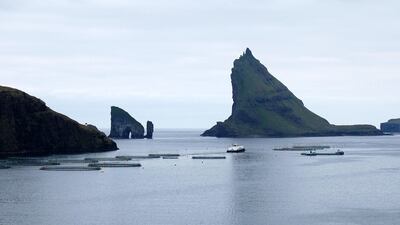After fuelling hopes of independence from Denmark at the turn of the millennium, the Faroe Islands' dreams of an oil bonanza have turned out to be more of a mirage than a miracle.
"We are confident that there is oil and gas here," said Kristina Hafoss, Finance Minister in the Danish autonomous territory in the North Atlantic, equidistant between northern most Scotland and south-east Iceland.
Even if there IS not a single oil platform in sight?
"It's just a question of getting enough companies to go out and search for it and then we will find it."
The oil majors lined up in the beginning.
In 2000, Britain's BP, Norway's Equinor (formerly known as Statoil) and Italy's Eni were among those who obtained licenses to prospect Faroese waters.
After nine test drills and much disappointment, the initial enthusiasm has now waned. Oil and gas was found in some wells, but the quantities were not enough to justify commercial production.
Equinor, the last of the oil companies to maintain an office on the Faroe Islands, shut its doors in 2015.
"We drilled a total of four exploration wells without making a commercial discovery, and based on the remaining potential we saw in the Faroe Islands the decision was made to exit," spokesman Erik Haaland said.
During the most recent licensing round last year, only one group showed interest but no licence was ever awarded.
The failure to find black gold could have extinguished the hopes of Faroese separatists, but the archipelago's economy is thriving thanks to profitable fisheries and fish farm sectors.
So much so that around half of the Faroe Islands' 50,000 inhabitants are toying with the idea of becoming independent from Denmark.
At the Faroese Geological Survey, experts are trying to make the most of the situation.
"It was a disappointment, I won't pretend it wasn't but given the timing, I'm not that surprised," said marine geologist Heri Ziska, referring to the weak oil price which has forced the oil industry to slash investments over the past few years.
Nonetheless, "we have very positive indications from some oil companies," he said, adding: "We can see that they are working in the area, so they're looking actively at it."
_______________
Read more:
New man at the helm for UK energy major seeking to fuel fracking boom
Masdar wind farms produce clean energy for nearly one million homes in UK
_______________
Off the nearby Shetland Islands, significant oil and gasfields have been found.
Anglo-Dutch group Shell and US group Chevron are set to develop the Combo and Rosebank fields, respectively, located just on the other side of the Faroes' maritime border.
"When you know that just a few kilometres from the Faroese border the UK finds oil all the time, it's quite sure that there is oil here," insists Poul Michelsen, the Faroese Foreign Minister in charge of oil issues.
In addition to their geographic remoteness, the Faroe Islands must also contend with the challenge of having a seabed made of basalt, an inhomogenous volcanic rock that complicates drilling and makes it more expensive.
Even though a major oil discovery has yet to be made, the Faroe Islands still have a flourishing oil sector.
With strong maritime traditions dating back to their Viking roots, more than 1,000 Faroese work in the offshore sector, either in the Faroes or elsewhere.
"That's one of the really big successes of oil exploration in the Faroes: we don't have oil production but we have a lot of income from oil," noted Mr Ziska.
Regin Joensen is one of those who makes a living on oil rigs.
Employed by a Norwegian oil services company, he is the supervisor of an underwater remote operated vehicle off the Ivory Coast.
"Working on a Norwegian contract, the money [is] great and the 2-4 rotation as well. If I work in the North Sea I'm on board for two weeks and then home for four weeks. Working in Africa, the rotation is four weeks on and eight weeks off."
For 134.3 days worked a year, he earns a monthly salary of almost €6,000 (Dh25,478), and he gets €935 for each additional day.
Aged 52, he can't imagine working in any other sector.
"You can't change the expensive habits you have developed over the years earning good offshore money."

